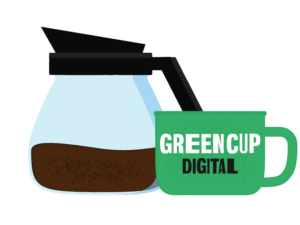Are you looking for new ways to increase online sales for your business? How about generating new leads to sell more of your services? Or, maybe you are just looking to grow your brand, and your organic efforts just don’t seem to be cutting it?
If you’ve nodded your head in agreement with any of these questions, you may want to consider adding PPC advertising to your marketing strategy!
If you’ve just lost interest after hearing “PPC,” thinking you don’t have the time or interest in another marketing acronym, don’t go! PPC can be a fantastic way to market your business and reach new buyers, but it definitely can be confusing at first for business owners just getting started.
This blog post will help you understand what PPC advertising is, how it works, and how you can use it to drive traffic to your website and thus increase your bottom line.
This is every business owner’s goal, right?
What is PPC?
PPC stands for pay-per-click advertising, a model of online marketing in which an advertiser pays every time an ad link is “clicked” on. Another name for PPC is CPC, which stands for cost-per-click. Search engines (like Google) and social networks (like Facebook) offer this model. While these platforms may be the most well-known PPC platforms, other platforms like Twitter and LinkedIn are quickly catching up in the pay-per-click game. For purposes of this post, we will focus on Google Ads as it is the most common publisher of PPC ads.
Businesses use PPC to drive traffic to their website, make sales, or gather leads from their target audience. The most significant benefit of this type of advertising is that it can be highly relevant. Search engines like Google and Bing are the most common way for people to search for products and services, meaning, when there is an active audience searching for what you have to offer, there is an opportunity to make a sale. Most attractively, PPC can help you get in front of the right people at the right time in a way that traditional advertising like radio, television, or billboards just do not allow for.
What About SEO?
You may be tempted to confuse PPC and SEO as similar ways to drive traffic from search engines. While both drive traffic from search engines, they are two very different channels. PPC involves paying for clicks. On the other hand, SEO (search engine optimization) is organic search-based. The clicks are free; however, SEO efforts will take time to rank organically. SEO is undoubtedly valuable. For example, an SEO audit can help with keyword research and align your website’s landing pages, blog posts, and local directory profiles with your ad targeting so you can yield the best results from both.
PPC and SEO are part of a more extensive digital marketing mix that works together to maximize your online success.
When Should You Use PPC?
The most common challenges a small business faces with PPC are competing with a small budget, building awareness, driving leads, maximizing ROI, and achieving recognizable growth. These should come as no surprise to you if you own a business!
So when should you use PPC ads? Here are some reasons to skip right to a pay-per-click methodology:
Immediate results are desired.
When done right, PPC will deliver quick results. You can almost count the minutes before a rush of visitors land on your page! The moment your PPC campaign is approved, your ads will immediately be placed for millions of people to see.
Highly targeted traffic is sought.
PPC will allow you to narrow down your prospects based on their demographic data. Even though Google and Facebook have tightened their requirements on what data you can target, the options for targeting far outweigh the options available in traditional advertising. You literally can serve your advertisement to exactly the person you want to buy your product or service.
Promoting a time-sensitive offer.
Marketing products, services, or events that expire is a great reason to use PPC. SEO is not appropriate for a quick turnaround. It’s meant for the long game.
Dominate search results for your keyword category.
PPC results are displayed above organic search results. Landing in this position means your website should appear first on the search engine result page.
If you’re serious about getting your business seen, you’ll want to invest in PPC!
Flexibility in ad spend.
PPC advertising falls under the digital marketing umbrella, with the keyword here being “digital.” You have complete control over your ad spend in real-time! If you’ve hit your sales quota for the month, you can pause your ads. If one keyword is outperforming another, you can easily adjust your budget. Not only does PPC give you flexibility in your marketing strategy, but how you allocate your marketing budget.
How Much Does PPC Cost?
So how much do Google Ads cost? It seems like a good question to ask, especially if you’re new to the paid advertising space. You need to know if you can afford it, right? We hate to break it to you, but the answer is the usual infuriating response of, “it depends.” Don’t worry; however, we’ll try to break it down so you can figure out if your budget can take on PPC this year or not.
The price of PPC advertising varies depending on your industry, customer lifecycle, trends, and how well you manage your account. Let’s look at each:
Industry
Generally speaking, the higher the dollar amount that is generated as a result of a sale, then the higher the cost per click. For example, in real estate, one new client could generate up to $10,000 for the business. Therefore, a cost per click of $50, or even $100, would be a small price to pay for that client.
Lifecycle
The length of time your buyer takes to make a purchase will also have an effect on the costs of your PPC marketing. For bigger ticket items, it will take longer for the buyer to make a decision; there may be more touchpoints, visits to your website, a download or two before they are able to make that final step of purchasing. The longer the customer lifecycle, the higher the investment.
Trends
Consumer trends are always a moving target. It is important to keep up with what is going on in your industry and make adjustments along the way. For example, during the height of the COVID crisis, people were shopping online more than ever before. Keyword competition in some industries went through the roof (hello mail order toilet paper), while others dropped significantly, like salon appointments.
Account Management
A recent study by Google showed that the average ROI on Google ads is $8 to $1, or 800%. Pretty impressive, right? That means that for every $1 you spend, you get $8 back. Unbelievable. The catch? It depends on how well you manage your account. You can’t just turn on your ad account and take a vacation. If you want to keep your costs low and your returns high, it will require constant review and tweaking, like:
- Proper Google Ads account structure
- Run performance reports and make data-driven optimizations
- Maintain your keyword lists
- Perform regular account audits
How Much Does a Typical Small Business Spend on Google Ads?
With all of the above said, you’re probably thinking, yes, that is great, but how much do I need to spend on ads? Again, this is another question without an easy answer. However, know that your PPC ads will be part of your overall online marketing costs. So if there’s room in the budget for additional spending, it is an excellent place to invest your hard-earned dollars.
As expected, what small businesses spend on PPC differs across industries. On average, our clients expect to pay a minimum $500+/month for Facebook and $1000+/month for Google. This doesn’t include set-up costs or management, usually billed hourly. According to Wordstream, the average small to midsize business spends anywhere from $1000-10,000 per month on their Google PPC campaigns.
Is PPC Right For You?
PPC advertising can be a profitable way to bring in more sales for your business. It has benefits that you can’t get from other forms of advertising, and it’s relatively easy to get started with the most popular platforms like Google and Facebook. If you take the time to create, launch, and optimize a campaign correctly, you can enjoy the increased traffic, conversions, and sales in no time!
Are you looking for help managing your Google Ads? We’ll help with strategy, design, implementation, and monthly reporting. Rates can vary, so contact us for a estimate today!





